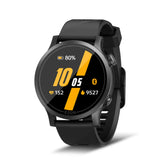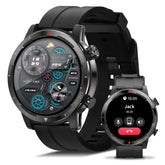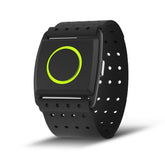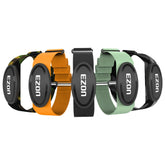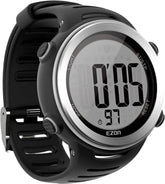Athlete's Nutrition Playbook: Fuel Your Body Based on Heart Rate Data
For athletes, nutrition is the engine that powers performance—and heart rate data is the dashboard that tells you how to fuel it. This guide reveals how to align athlete nutrition with your body’s energy needs, using real-time heart rate insights to optimize fueling for every workout, recovery, and race. Say goodbye to guesswork—hello to precision nutrition.
1. Decode Energy Expenditure with Heart Rate
A. Heart Rate = Energy Burn (kcal/min)
-
Formula: Estimate calorie burn using heart rate zones:
- Zone 2 (60–70% MHR): 8–10 kcal/min (ideal for steady endurance).
- Zone 4 (80–90% MHR): 12–15 kcal/min (high-intensity efforts).
- Heart Rate Monitor Tip: Most watches calculate this automatically, syncing with apps like MyFitnessPal for precise intake planning.
B. The 3 Energy Systems at Play
| System | Heart Rate Zone | Fuel Source | Nutrition Focus |
|---|---|---|---|
| Aerobic | Zone 1–3 | Fat + Carbs | Steady carbs (oats, rice) + healthy fats |
| Anaerobic | Zone 4–5 | Carbs (glycogen) | Quick-digesting carbs (gels, sports drinks) |
| Phosphagen | Max effort | ATP/PC stores | Minimal nutrition needed (seconds-long efforts) |
2. Nutrition Strategies for Every Workout Type
A. Endurance Workouts (Zone 2–3, >60 minutes)
Pre-Workout (2–3 hours out)
- Goal: Maximize glycogen stores.
- Meal: 1g/kg carbs + 0.3g/kg protein (e.g., 70kg athlete: 70g carbs [oatmeal] + 21g protein [eggs]).
- Heart Rate Insight: Check resting heart rate (RHR)—a higher RHR may mean smaller portions to avoid digestion stress.
Mid-Workout
- Fueling: 30–90g carbs/hour (1–3 energy gels), depending on intensity (higher heart rate = more carbs needed).
- Hydration: 500–1,000mg sodium/hour (electrolyte tablets) to replace sweat loss—critical if heart rate creeps above Zone 3.
Post-Workout
-
Recovery Window: 30–60 minutes post-finish:
- 1.5g carbs/kg + 0.4g protein/kg (e.g., 105g carbs [banana + rice] + 28g protein [chicken]).
- Heart Rate Data Use: Sync calorie burn to ensure you’re in a slight surplus for glycogen repletion.
B. Strength Training (Zone 3–4, 45–90 minutes)
Pre-Workout (1 hour out)
- Goal: Boost energy without heaviness.
- Snack: 50g carbs + 20g protein (e.g., Greek yogurt + granola).
- Heart Rate Tip: Aim for heart rate 60–70% MHR during warm-up to prime muscles.
Post-Workout
- Muscle Repair: 20–30g protein within 60 minutes (e.g., whey protein shake + 30g carbs [apple]).
- HRV Insight: Low heart rate variability (HRV) post-lifting signals increased need for amino acids (add 5g BCAAs to recovery drink).
C. HIIT (Zone 4–5, 20–30 minutes)
Pre-Workout (30 minutes out)
- Quick Fuel: 20g fast carbs (honey + toast) to spike blood sugar for explosive efforts.
- Heart Rate Check: Ensure heart rate is calm (Zone 1) before starting to avoid early fatigue.
Post-Workout
- Metabolic Boost: Prioritize protein (30g) + moderate carbs (50g) to preserve muscle and boost EPOC (afterburn effect).
3. Race-Day Nutrition: Timing is Everything
A. 3–4 Days Pre-Race (Carbo-Loading)
- Protocol: 8–10g carbs/kg body weight daily (e.g., 70kg athlete: 560–700g carbs), focusing on low-fiber sources (white rice, pasta) to avoid gut issues.
- Heart Rate Link: Track resting heart rate—stable RHR indicates efficient glycogen storage.
B. Race Morning (2–3 hours before)
- Meal: 1g/kg carbs (oatmeal + honey) + minimal fat/protein to aid digestion.
- Heart Rate Monitoring: Avoid overeating—keep heart rate below 60% MHR to prevent sluggishness.
C. During the Race
-
Fueling Schedule:
- Marathon/Ultra: 60g carbs/hour (2 gels) + electrolytes every 30 minutes.
- Sprint Events: 30g carbs/hour (1 gel) + water only for races <90 minutes.
- Heart Rate Adjustment: If heart rate exceeds goal zone by 5 BPM, reduce pace and take an extra gel to avoid bonking.
4. Recovery Nutrition: Repair and Rebuild
A. Overnight Recovery
-
Sleep & Nutrition Synergy:
- 7–9 hours sleep to optimize protein synthesis (critical for muscle repair).
- Pre-bed Snack: 20g casein protein (slow-digesting) + 30g carbs (rice cakes) for overnight recovery.
- HRV Guidance: Low HRV (below 40) means add 10g extra protein and 500mg magnesium (almonds) to reduce stress.
B. Hydration Beyond Water
- Electrolyte Ratio: 3:1 sodium:potassium in post-workout drinks (e.g., 300mg sodium + 100mg potassium per 500ml).
- Heart Rate Insight: Rapid heart rate recovery (20 BPM/min) indicates proper hydration; slow recovery means increase sodium intake by 20%.
5. How to Use Heart Rate Data for Long-Term Optimization
A. Weekly Nutrition Review
- Calorie Burn Trend: Ensure weekly intake matches training load (e.g., 50km running week = 3,500 extra calories).
- HRV & Micronutrients: High HRV = maintain current plan; low HRV = add antioxidants (berries, spinach) to reduce inflammation.
B. Customized Meal Plans
- Endurance Athletes: Higher carb focus (60% of calories) during high-mileage weeks (Zone 2 training dominates).
- Strength Athletes: Protein prioritization (1.6g/kg) during hypertrophy phases (Zone 4 workouts).
6. Gear for Precision Nutrition
A. Heart Rate Monitor Features
| Feature | Nutrition Benefit | EZON Recommendation |
|---|---|---|
| Real-Time Calorie Burn | Accurate energy expenditure for meal planning | EZON Heart Rate Series |
| HRV Analysis | Guides recovery nutrition adjustments | EZON Pro Wellness Watch |
| Meal Reminders | Custom alerts for pre/post-workout fueling | EZON Smart Nutrition Watch |
B. Essential Tools
- Food Scale: Weigh portions to match calorie burn data (critical for precision).
- Hydration Backpack: Carry electrolyte tablets and track water intake against heart rate-driven needs.
7. Common Nutrition Mistakes to Avoid
-
One-Size-Fits-All Plans:
- Solution: Use heart rate data to personalize—e.g., higher heart rate during workouts mean more carbs per hour.
-
Ignoring Post-Workout Protein:
- Solution: Set a watch alert for “Recovery Fuel” 30 minutes post-finish to ensure protein intake.
-
Overlooking Electrolytes:
- Solution: Use heart rate recovery time to gauge sodium needs—slow recovery = add salt to meals.
8. FAQs: Your Nutrition Data Questions Answered
Q: How do I know if I’m underfueling?
- Signals: Elevated heart rate at easy paces, poor recovery, HRV drop. Solution: Increase carbs by 10% and recheck heart rate data.
Q: Can heart rate data help with weight management?
- Yes! Track daily calorie burn vs. intake—aim for 300–500 calorie deficit on rest days, maintenance on training days.
Q: What’s the best drink for high-heart-rate workouts?
- 6–8% carb solution (e.g., 30g carbs per 500ml) + 150mg sodium to maintain blood sugar and electrolyte balance.
Fuel Like a Pro, Perform Like a Champion
With heart rate data as your nutrition coach, every meal becomes a strategic move toward peak performance. Use it to decode energy needs, time fueling perfectly, and recover faster than ever. Whether you’re chasing a marathon PR or lifting personal bests, let data-driven nutrition be the edge that turns good training into great results.
Gear up with a reliable heart rate monitor, sync your meals to your workouts, and trust the science of fueling. Your body has unique energy demands—now give it exactly what it needs, when it needs it. The podium (or personal best) is within reach—start fueling like the athlete you are.
EZON Watch: Professional sports technology brand
https://ezonwatch.com
https://ezonwatch.com
